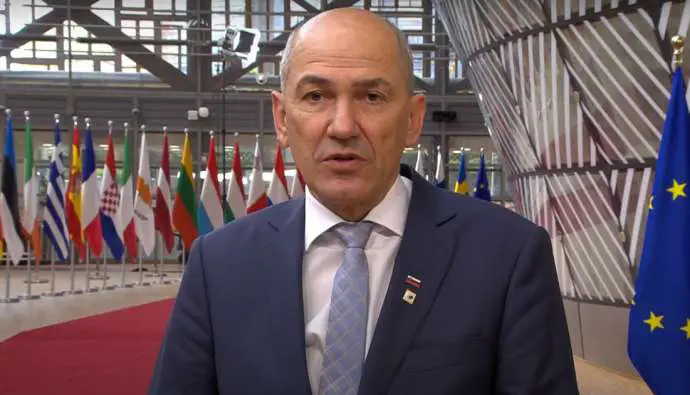STA, 26 May 2021 - Prime Minister Janez Janša survived an impeachment vote in parliament on Wednesday as 42 deputies voted in favour and 44 against after nearly ten hours of debate. A 46-vote majority would have been required to impeach him.
The voting record shows the coalition parties as well as the National Party (SNS), two MPs of the Pensioners' Party (DeSUS) and both minority MPs voted against the impeachment, which had been expected from the debate.
The impeachment motion was sponsored by the Marjan Šarec List (LMŠ), Social Democrats (SD), Left and the Alenka Bratušek Party (SAB), who accused Janša of violating several articles of the Constitution and laws pertaining to healthcare, media, prosecution and human and constitutional rights.
They said the government co-opted the management of the Covid-19 epidemic and failed to order Slovenia's share of Covid-19 vaccines in full, and exerted pressure on the media, including the Slovenian Press Agency (STA), and the prosecution.
Jani Möderndorfer (LMŠ) said that as interim health minister Janša failed to get Slovenia to buy its full share of Covid-19 vaccines, and as prime minister was responsible for the government failing in its legal obligation to finance the STA for its public service, and in the obligation to get formally acquainted with the names of candidates for European delegated prosecutors.
"He acts against the laws and constitution, and international instruments which Slovenia - like it or not - has committed to respecting," said Möderndorfer, describing Janša's conduct as "arbitrary, authoritarian, harmful and dangerous" and "in ridicule of democracy and his own country and people".
He said the reason for Janša's unlawful and unconstitutional conduct was his personal war on everything that was independent and autonomous in any democratic country. The media were his first target and the STA the easiest of them.
Speaking for the SocDems, Bojana Muršič said Slovenia was being ruled by an authoritarian government which had no regard for laws, the Constitution, let alone people in pursuing its goals. "Blatant violations have come to become an everyday practice."
"We have a clique in power who will dare do anything and all the others have been subjected for a year to completely arbitrary attempts to delegate laws, norms, decrees and even punishments," said Luka Mesec, the leader of the Left, blaming not only Janša but all those in parliament who allowed him to do what he did.
Similarly, Maša Kociper from the SAB talked about Slovenia sinking into an autocracy and a second republic. The prime minister "is systematically abolishing our political and democratic order, helped by the coalition and its sidekicks, who either don't see it or won't see it because they are intoxicated with power".
Janša dismissed the claims in general terms saying the impeachment motion contained "so many absurd things that it does not make sense to answer all of them, and it does not make sense to quarrel about that".
Slovenia was not in for a disaster as claimed by the opposition, but very optimistic times, he said. "We can see a year of recovery ahead of us that will be faster than the average for EU member states and that will take Slovenia back to pre-crisis levels in record time."
He said that, given the situation, it could be expected that the state of epidemic, in force until mid-June, would be suspended thereafter and that Slovenia could enter a transitional period when a majority of measures would be eliminated as Slovenia reaches the required level of vaccination by the summer.
He blamed the 4,000-plus Covid-19 deaths on the previous government failing to prepare for the epidemic.
As for the media, he claimed EUR 400 million had been invested in Slovenian hospitals in the last ten years, while more than a billion had been invested in the national broadcaster RTV Slovenija and the STA in the same period.
The figure probably referred to the licence fee for RTV Slovenija, which is not paid by the state but by taxpayers, and the public service fee for the STA, which has amounted to roughly 22 million euro over ten years.







